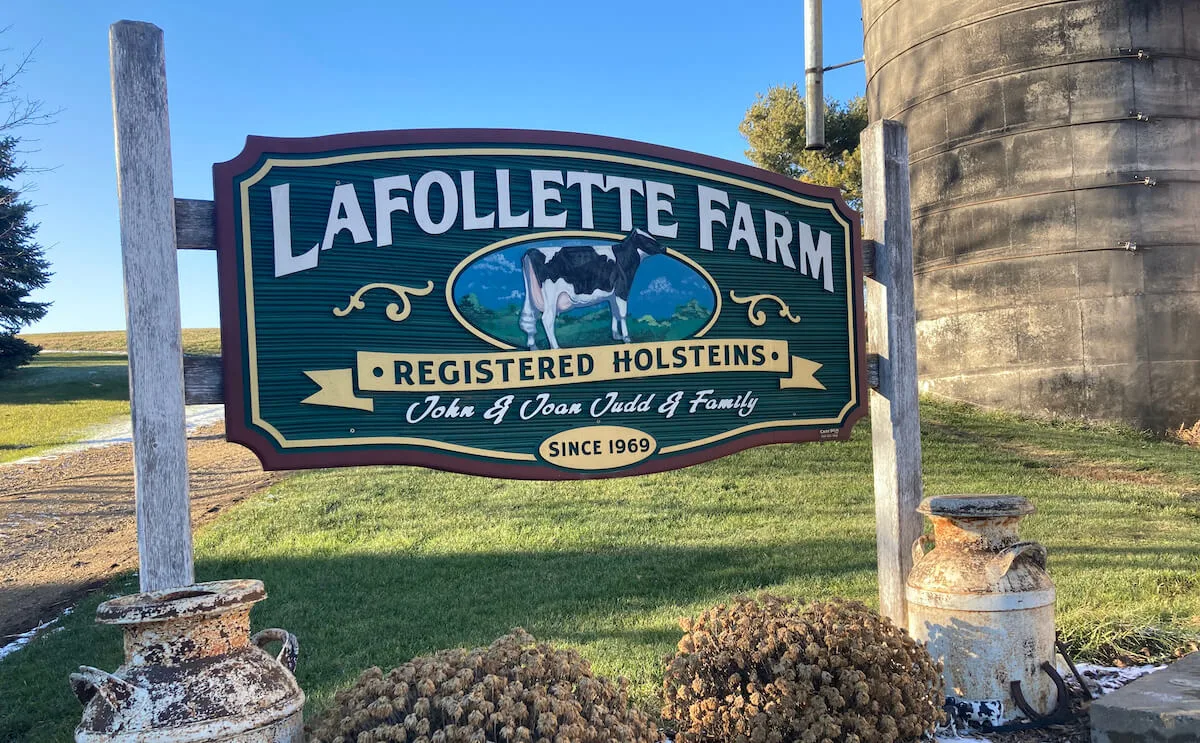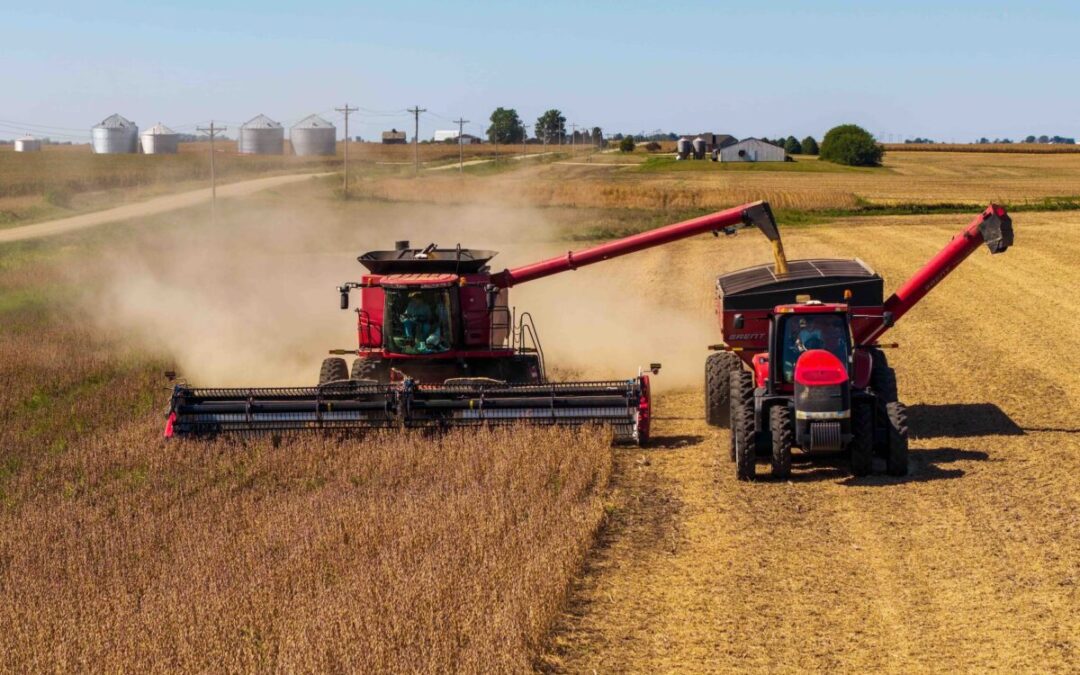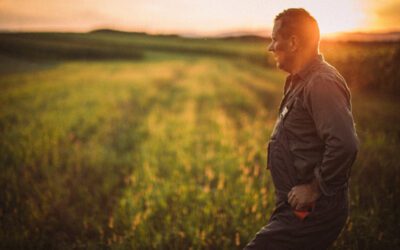
#image_title
The legendary progressive politician’s birthplace will become Wisconsin’s latest dairy farm loss.
When the auctioneer brings down the gavel on Thursday, it will mark the end of the dairying era at the La Follette farm, birthplace of Robert M. “Fighting Bob” La Follette, the father of the Progressive movement.
Cows with names like La-Follette Crush Reba and La-Follette Luster Ramona will be headed to new barns and, for the first time since anyone can remember, the daily milkings will cease on the La Follette Farm, located in Primrose about 20 miles southwest of Madison.
In many ways, it’s a story being repeated across the Dairy State. When John and Joan Judd bought the farm in 1969, there were more than 60,000 dairy farms in Wisconsin. Today that number is at 6,600 and falling.
But this isn’t just any farm. The Judds are only the fourth owners of these hilly 216 acres. They possess a legal abstract dating back to 1850, when La Follette’s parents Josiah and Mary bought a parcel of wilderness. The La Follette family constructed a two-room log cabin alongside a tributary to the Little Sugar River. Robert Marion La Follette was born there in June 1855, the last of five children and one of the last politicians who could claim to have been born in a log cabin.
RELATED: Another Auction Ends a Family Farm
The cabin is long-gone, but a stone marker near Judd’s machine shed marks the spot. And the Judds say that in drought years, the cabin makes a ghostly reappearance.
“When we have a dry year, you can see the outline of the foundations in the grass,’’ John said.
And, said Joan, “You can even see the two rooms and the gap in the wall where they must have had a door and a walkway down to get water from the creek.”

The History
La Follette’s childhood wasn’t easy. His father died when he was an infant. After his stepfather also died, he and his mother returned to the farm, on which he worked. He would then sell produce in Madison to support his family.
The man who would later be known for his powerful speeches had a precocious start. When a schoolhouse was built just up the hill, 3-year-old Robert recited a poem while standing on the teacher’s desk to mark the occasion:
You’d not expect one of my age
To speak in public on the stage.
A century later, John Judd attended school at Dixon schoolhouse, which was built in 1899 to replace the building where young La Follette spoke. Judd was born on an adjoining farm, which is still operated by his brothers.
As a young man, Judd followed La Follette’s footsteps to UW-Madison, where he attended the Farm and Industry Short Course, a certificate program for beginning farmers.
“It only lasts 15 weeks, but you create friendships there that last a lifetime,’’ he said.
The ideas he learned at “short course” spurred John to a lifetime of improving his farm, both through improving the genomics of his registered Holsteins dairy and by increasing the productivity of the cropland. He noted that when he first began farming the land on shares with his father, naysayers predicted that his 32 cows would starve because the land was so poor. Thanks to his improvements, the farm now grows enough hay and corn to support 130 head of cattle, with corn left over to sell.

‘Ownership of Soil’
Earlier this year, John Judd was named the 2021 Master Agriculturalist by the Wisconsin Agriculturist magazine.
“We take great pride that one of our own peers nominated us for that award,’’ John said, “recognizing us for what we’ve accomplished.”
La Follette left Primrose and was eventually elected to the US House, the governorship, and the US Senate.
Likewise, both Judds have had leadership positions. Joan served on the board of the Wisconsin Holstein Association and John served on the Mount Horeb School Board. During that experience, he said he made decisions that “made people mad,” including voting to close down the rural La Follette Heights School that was built in 1962 as part of shutting down the one-room schools around the area. It closed in 1982.
John Judd is 70 now, and said that there aren’t new farmers who are able to buy and cash-flow a farm as small as his. The couple will stay on the farm but Judd isn’t certain what life will be like when he isn’t milking cows twice a day, every day.
“I’ve been milking cows since I was 10 years old,’’ he said.
Old Bob La Follette himself knew well the hardships and close accounting needed to make a living on a small farm in Wisconsin. In a speech to Congress in 1886, on the threat that oleomargarine posed to dairy farmers, La Follette noted that the success of dairy farms was crucial to the success of the nation:
“Almost all of the farmland in this country is held and owned by men who cultivate it. Ownership of soil means ownership of home, and I tell you that the government whose people build and own their own homes lays broadest and deepest its foundation. Such homes, no matter how humble, are pledges of the perpetuity of the nation.“
La Follette said that such farmsteads are “maintained only by industry and frugality.”
“Sir, I know something of life upon the farm … I know the vital, the absolutely vital importance of the dairy to the maintenance not only of home comfort, the sweetening of the home life, but its great value to that which makes the home possible—the farm itself.”

Retired veterinarian uses pasture for seasonally grazing dairy heifers and extra income
BEAR CREEK, Wisconsin – Earlier this year Jeff and Alex Wepner were looking for a place where their dairy heifers could grow and develop during the...

China has resumed U.S. soybean imports. It might not be enough for Wisconsin farmers
After a tense months-long standoff over tariffs, China has agreed to resume U.S. soybean imports in exchange for the U.S. easing up its tariff...

China is boycotting American soybeans. Wisconsin farmers will pay the price for it, trade group says
As China and the U.S. remain locked in a tense standoff over tariffs, Wisconsin soybean farmers have found themselves in the crossfire of the...

In Portage County, residents fight for a say in local government
One of my favorite photos of my friend Jason Dunkin is a selfie he took where he’s grinning ear to ear. He’s sitting across from his local city...




